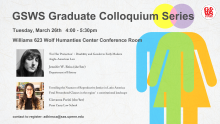Jennifer W. Reiss (she/her)
"‘For Her Protection’: Disability and Gender in Early Modern Anglo-American Law"
William Blackstone, that touchstone of eighteenth-century common law, described the legal concept of coverture in the following terms: “By marriage… the very being or legal existence of the woman is suspended… the disabilities which the wife lies under, are for the most part intended for her protection and benefit. So great a favourite is the female sex of the laws of England.” The collocation of womanhood and disability gestures to the gendered dimensions of eighteenth-century understandings of capacity and the dialectic between dependence and independence that structured Anglo-American society. This paper suggests that, given our interest in early modern beliefs about capacity, historians of disability in the ‘vast early Americas’ need to pay closer attention to how capacity and disability in the period were not just contemporarily understood alongside gender (and other identity categories), but were in fact inextricably defined by conceptualizations of gender. Thinking about femaleness as inherently disabling – a threshold of disablement – in the early modern common law should push us to pay closer attention to how gender and disability were mutually constructed and constituted through the histories of disability we are now uncovering.
Giovanna Parini (she/her)
"Unveiling the Nuances of Reproductive Justice in Latin America: Fetal Personhood Clauses in the region’s constitutional landscape"
In the aftermath of the Dobbs decision and the "Green Wave" movement sweeping through Latin America, the region has emerged as a focal point for discussions on reproductive justice. While countries like Argentina, Mexico, and Colombia have made significant strides in liberalizing abortion laws, several others continue to criminalize and restrict access to abortion. Notably, the countries with the most restrictive policies in the region often share a common constitutional trait: fetal personhood clauses embedded in their right-to-life provisions. In this presentation, I will explore the fetal personhood clauses across the region and their meanings and narratives, as analyzed by their Supreme Courts. Contrary to common belief, I argue that these clauses are not a normative barrier to advancing reproductive autonomy as a constitutionally protected right. Drawing on successful cases of constitutional interpretation in Colombia and Mexico, where reproductive autonomy has been upheld, I will argue that existing constitutional frameworks can recognize reproductive freedom despite the presence of an explicit fetal personhood clause.
Contact to Register: adkinsca@sas.upenn.edu

 The Program in Gender, Sexuality, and Women’s Studies
The Program in Gender, Sexuality, and Women’s Studies